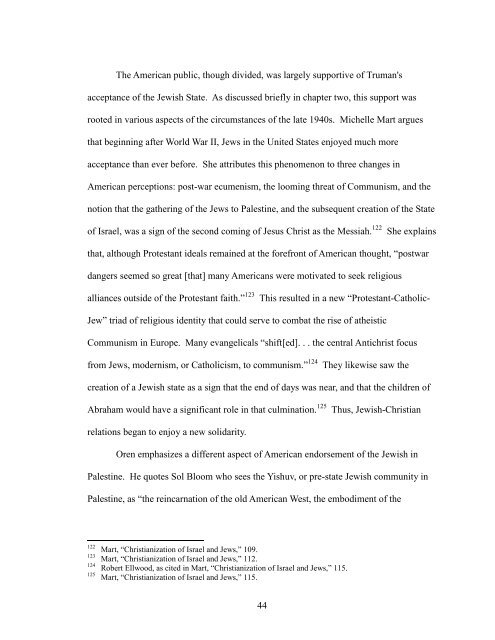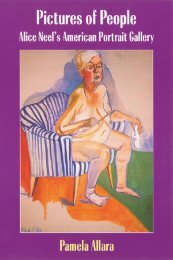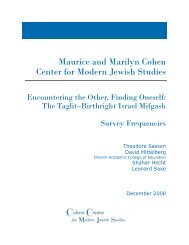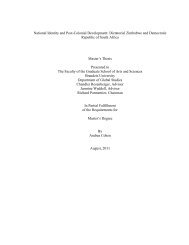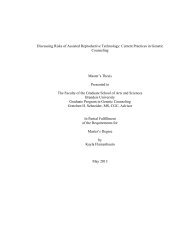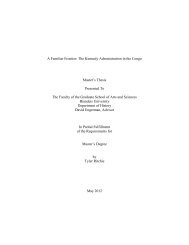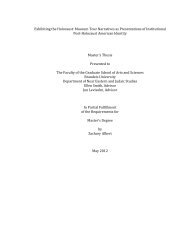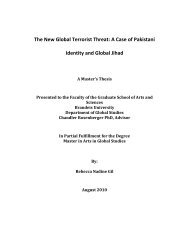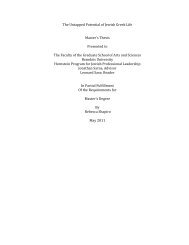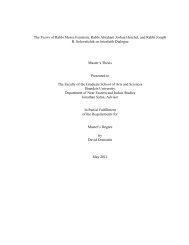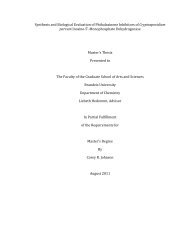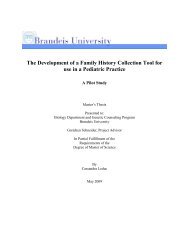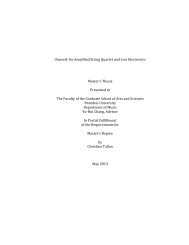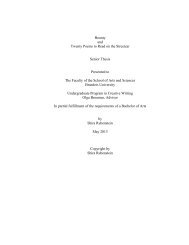The American public, though divided, was largely supportive <strong>of</strong> Truman'sacceptance <strong>of</strong> <strong>the</strong> Jewish <strong>State</strong>. As discussed briefly in chapter two, this support wasrooted in various aspects <strong>of</strong> <strong>the</strong> circumstances <strong>of</strong> <strong>the</strong> late 1940s. Michelle Mart arguesthat beginning after World War II, Jews in <strong>the</strong> United <strong>State</strong>s enjoyed much moreacceptance than ever before. She attributes this phenomenon to three changes inAmerican perceptions: post-war ecumenism, <strong>the</strong> looming threat <strong>of</strong> Communism, <strong>and</strong> <strong>the</strong>notion that <strong>the</strong> ga<strong>the</strong>ring <strong>of</strong> <strong>the</strong> Jews to Palestine, <strong>and</strong> <strong>the</strong> subsequent creation <strong>of</strong> <strong>the</strong> <strong>State</strong><strong>of</strong> <strong>Israel</strong>, was a sign <strong>of</strong> <strong>the</strong> second coming <strong>of</strong> Jesus Christ as <strong>the</strong> Messiah. 122She explainsthat, although Protestant ideals remained at <strong>the</strong> forefront <strong>of</strong> American thought, “postwardangers seemed so great [that] many Americans were motivated to seek religiousalliances outside <strong>of</strong> <strong>the</strong> Protestant faith.” 123 This resulted in a new “Protestant-Catholic-Jew” triad <strong>of</strong> religious identity that could serve to combat <strong>the</strong> rise <strong>of</strong> a<strong>the</strong>isticCommunism in Europe. Many evangelicals “shift[ed]. . . <strong>the</strong> central Antichrist focusfrom Jews, modernism, or Catholicism, to communism.” 124 They likewise saw <strong>the</strong>creation <strong>of</strong> a Jewish state as a sign that <strong>the</strong> end <strong>of</strong> days was near, <strong>and</strong> that <strong>the</strong> children <strong>of</strong>Abraham would have a significant role in that culmination. 125 Thus, Jewish-Christianrelations began to enjoy a new solidarity.Oren emphasizes a different aspect <strong>of</strong> American endorsement <strong>of</strong> <strong>the</strong> Jewish inPalestine. He quotes Sol Bloom who sees <strong>the</strong> Yishuv, or pre-state Jewish community inPalestine, as “<strong>the</strong> reincarnation <strong>of</strong> <strong>the</strong> old American West, <strong>the</strong> embodiment <strong>of</strong> <strong>the</strong>122123124125Mart, “Christianization <strong>of</strong> <strong>Israel</strong> <strong>and</strong> Jews,” 109.Mart, “Christianization <strong>of</strong> <strong>Israel</strong> <strong>and</strong> Jews,” 112.Robert Ellwood, as cited in Mart, “Christianization <strong>of</strong> <strong>Israel</strong> <strong>and</strong> Jews,” 115.Mart, “Christianization <strong>of</strong> <strong>Israel</strong> <strong>and</strong> Jews,” 115.44
pioneering spirit.” 126He later asserts that “for nearly two hundred years, Americans haddreamed <strong>of</strong> transforming <strong>the</strong> Middle East into a reflection <strong>of</strong> <strong>the</strong>ir own United <strong>State</strong>s –democratic, modern-minded, <strong>and</strong> free.” 127For many Americans <strong>the</strong> modern Jewish staterepresented precisely those values. Likewise, <strong>the</strong> media played a role in popularizing<strong>Israel</strong> in American society. In <strong>the</strong> dispute over who would control Jerusalem, <strong>the</strong> pressemphasized <strong>the</strong> Jews' willingness to internationalize <strong>the</strong> Holy City, while at <strong>the</strong> same timehighlighting Arab rejection <strong>of</strong> any sort <strong>of</strong> compromise. 128Keeping in line with Americanpublic opinion, both <strong>the</strong> Democrat <strong>and</strong> Republican platforms adopted pro-Zionistplatforms by 1945, <strong>and</strong> both houses <strong>of</strong> Congress resolved that “Palestine must be 'openfor <strong>the</strong> free entry <strong>of</strong> Jews' <strong>and</strong> <strong>the</strong> country 'reconstitute[d] . . . as a free <strong>and</strong> democraticJewish commonwealth.'” 129This is not to imply that American was finally free from lingering anti-semiticsentiments, or that it wholeheartedly supported <strong>the</strong> Jewish state. On <strong>the</strong> contrary,American support for <strong>Israel</strong> was at best divided <strong>and</strong> uncertain, even after Holocaust.Notable American leaders such as Henry Ford <strong>and</strong> Fa<strong>the</strong>r Charles Coughlin remainedresolute <strong>and</strong> outspoken anti-semites. 130 And while it is true that Americans felt someguilt over <strong>the</strong> fate <strong>of</strong> <strong>the</strong> six million Jews who died in <strong>the</strong> Holocaust, 131 Grose reports thatmost Americans were “not particularly interested” in <strong>the</strong> Jews in Palestine. 132He quotes<strong>the</strong> British Embassy in 1947: “In <strong>the</strong> middle west <strong>the</strong>re is some support by non-JewishAmericans for <strong>the</strong> Zionist cause because <strong>the</strong>y do not want more Jews in <strong>the</strong> United126127128129130131132Oren, Power, Faith <strong>and</strong> Fantasy, 431.Oren, Power, Faith <strong>and</strong> Fantasy,474.Mart, “Christianization <strong>of</strong> <strong>Israel</strong> <strong>and</strong> Jews,” 118.Oren, Power, Faith <strong>and</strong> Fantasy, 468.Oren, Power, Faith <strong>and</strong> Fantasy, 426.Grose, <strong>Israel</strong> in <strong>the</strong> Mind <strong>of</strong> America, 207, 214.Grose, <strong>Israel</strong> in <strong>the</strong> Mind <strong>of</strong> America, 213.45
- Page 2 and 3: AcknowledgementsI am indebted to Pr
- Page 4 and 5: Table of ContentsIntroduction - 1Ch
- Page 6 and 7: elationship in any depth.In researc
- Page 8 and 9: friendships with various Israeli le
- Page 10 and 11: Joseph Smith taught that Latter-day
- Page 12 and 13: Gentiles, and it will be again inha
- Page 14 and 15: for their long suffering. Yet, he,
- Page 16 and 17: focus on both the fulfillment of pr
- Page 18 and 19: Smith and Brigham Young, as previou
- Page 20 and 21: Smith, the members of the group “
- Page 22 and 23: Jews.'” 46Benjamin further descri
- Page 24 and 25: Chapter 2: Benson's Religious Leade
- Page 26 and 27: audiences. The first, called, “Je
- Page 28 and 29: Benson's sense of kinship for the J
- Page 30 and 31: eturn of the Jews to the land of Pa
- Page 32 and 33: general mention of his efforts at s
- Page 34 and 35: Or perhaps it did not aid in his ap
- Page 36 and 37: about Jews and Israel, throughout t
- Page 38 and 39: and Peter Grose describe the frustr
- Page 40 and 41: Israel's victory in the Six Day War
- Page 42 and 43: the Messiah. Indeed, both Benson an
- Page 44 and 45: those visits, as opposed to those o
- Page 46 and 47: U.S. agricultural products on credi
- Page 50 and 51: States.” 133Indeed, a Gallup poll
- Page 52 and 53: with Britain and France, for their
- Page 54 and 55: many Americans that Israel was now,
- Page 56 and 57: those experiences to give validity
- Page 58 and 59: Benson, “I want you to pray to Go
- Page 60 and 61: gathering. Some of those themes inc
- Page 62 and 63: Ben Gurion and Levi Eshkol, both of
- Page 64 and 65: sending “two Mormon Books,” and
- Page 66 and 67: Yet Ben Gurion's next letter, dated
- Page 68 and 69: on this occasion with Shimon Peres
- Page 70 and 71: cultivate land for crops in the 194
- Page 72 and 73: attitude in the Synagogue Light art
- Page 74 and 75: United States, his views on Israel
- Page 76 and 77: eminded the host that he had not be
- Page 78 and 79: Thee, O Father, Lord of heaven and
- Page 80 and 81: "Though Thy servant is now far from
- Page 82 and 83: BibliographyAlteras, Isaac. Eisenho
- Page 84 and 85: Madsen, Truman G. “Mormon Attitud


